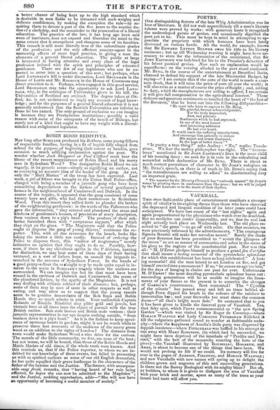ROBIN HOOD REDWIVUS.
Nor long after SCHILLER produced his Robbers, some young fellows of respectable families, having in a fit of boyish folly eloped from school for the purposepf beginning their career as bandits, gave occasion to much edifying declamation against the poet. We wonder whether Jack Sheppard or Paul Clifford must bear the blame of the recent reappearance of Robin Clifford and his merry men in Sydenham Wood ? The designation Robin Hood we use vaguely, in its generic sense—simply as signifying an outlaw, not as conveying an accurate idea of the leader of the gang. As yet, only the " Maid Marian " of the troop has been captured. Last week, a girl of fifteen was brought to the Union Hall Police-office, charged with being a member of a juvenile gang who have been committing depredations on the larders of several gentlemen's houses in the neighbourhood of Camberwell and Dulwich. In the course of the inquiry, it appeared that the gang consisted of some twenty boys and girls, who had their rendezvous in Sydenham Wood. From this resort they sallied forth to plunder the larders of the neighbouring gentlemen : in the words of the Policemen who gave the information, " they entered and plundered the areas and kitchens of gentlemen's houses, of provisions of every description, from venison down to a pig's head." The produce of their rob- beries furnished them with " sumptuous suppers," after which they slept on the grass. " The Magistrate said that the Police ought to disperse the gang of young thieves," continues the re- porter. This, with all due reverence for the bench, looks like taking the matter a little too coolly. Instead of ordering the Police to disperse them, this "mirror of magistrates" merely intimates an opinion that they ought to do so. Possibly, how- ever, if there be any chivalrous spirits in the P division, burning for distinction, we may hear some of these days of their having ventured, as a sort of forlorn hope, to assault the brigands in- trenched in the recesses of Sydenham Forest. In the hands of a good penny-a-liner the onslaught may be made quite equal in in- terest to the scene in SCHILLER'S tragedy where the outlaws are surrounded. We can imagine the hot ire that must have been roused in the environs of Dulwich and Camberwell, the scene of the plundered larders, by the apathy of the Magistrate. It is not easy dealing with citizens robbed of their dinners ; but, perhaps, some of them may be men of taste in other respects as well as eating, and may allow us to suggest that the young rascals seem to be genuine descendants of the Rob Roys and Robin Hoods they so much admire in print. Your outlandish Captain Rolando or Rinaldo Rinaldini may pilfer gold and jewels, but victuals have at all times been the object of pursuit with the true British outlaw. Rob stole beeves and Robin stole venison : their juvenile representatives in our age despise nothing eatable, " from venison down to a pig's head." As it is the fashion to keep speci- mens of ravenous beasts in gardens, might it not be worth while to preserve these last remnants of the emblems of the merry green wood as an addition to the sights of London ? The distance from town would make Sydenbam Wood a nice drive for the curious. The morals of the little community, we fear, are none of the best ; but not worse, we will be bound, than those of the Robin Hoods and Maids Marian of old times, if the whole truth were known. And this reminds us, that if the Police reporter, to whom we are in- debted for our knowledge of these events, has failed in presenting us with as spirited outlaws as some of our old English dramatists, he has quite equalled their grave burlesque in the characters of the father of the heroine and the Justice. The former, with unsurpass- able sang froid, remarks, that " having heard of her ruin being effected, he hopes she can now be admitted to the Magdalen " ; and the Justice, nodding approbation, adds—" She will now have an opportunity of becoming a useful member of society."


























 Previous page
Previous page